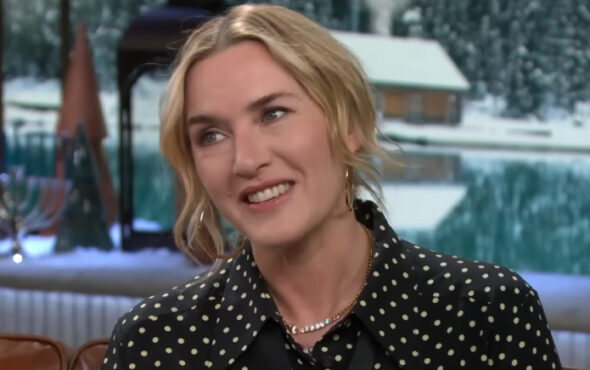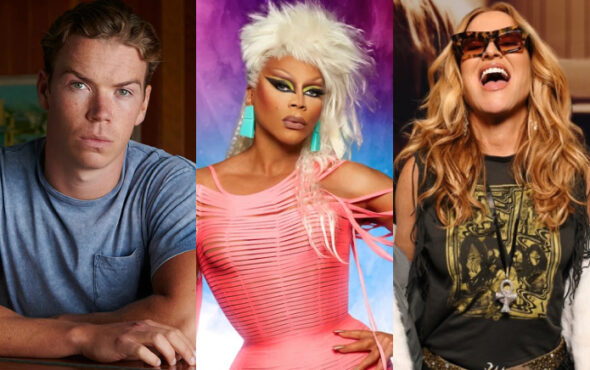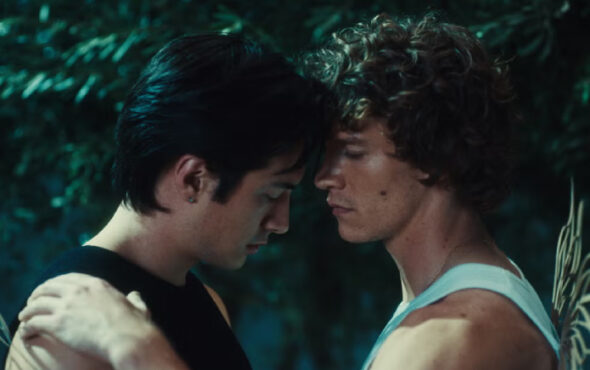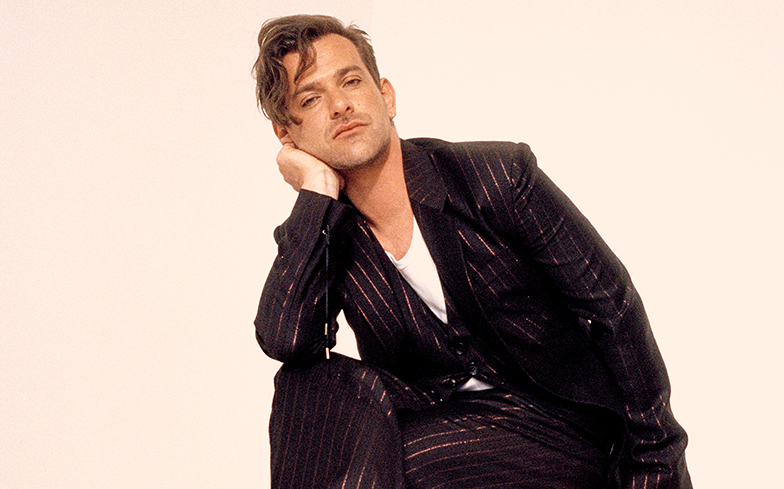
“I find it reductive.”
After taking a four-year absence from the music industry, in which he moved to Berlin, consumed mushrooms and became a father (to a poodle), Josef Salvat made a triumphant comeback last week with pop anthem, Modern Anxiety.
The track, which unsurprisingly deals with anxiety (and how “our lives interface constantly with the internet”) was accompanied by a visual unlike any we’ve ever seen. Designed to be watched vertically on a phone, the video takes us on a trip around East London and is played out across several social media platforms such as Twitter and TikTok. It’s genius.
“I don’t want people to be bored watching the music video, that was my main thing,” Josef admits.
“I would love for people to feel anxious, but in the way you feel anxious when you’re on a rollercoaster, to get some sort of visceral, physical experience. If I can achieve that, then that’s amazing, like I’ve overridden the system.”
Because he doesn’t do comebacks half-heartedly, Josef also released another taste from his upcoming sophomore album: Alone. To commemorate all three releases, we caught up with the Aussie singer-songwriter to discuss his new music, where the video for Modern Anxiety stemmed from and why he rejects the ‘gay music’ label.
It’s been a few years! What have you been up to since Night Swim?
I’ll quickly recap four years. Long story short, since Night Swim, I left London, went to Berlin. So that was around in 2016, lived in Berlin for a year, the first five months were amazing. I had the most incredible time and experiences, like mushrooms, a lot of mushrooms. A lot of fucking palo santo and tarot, that kind of shit, the really cliché Berlin stuff. And there was love and friends and all of that. And then it shifted because I got randomly beaten up on New Year’s Eve, and that kind of changed everything for the rest of Berlin, and I was there for another seven months. And that’s when I started writing, because I got so miserable. So that’s how Modern Anxiety was written. And then I floated about for seven months, and then I came back to London because I decided that London wasn’t as bad as I thought it was. Everywhere is pretty bad when your head’s not the nicest place, so it was that realisation. So, I moved back here, got Monty, my dog, who is eating cigarette papers. And I got my little house, can’t believe my boiler’s broken, standing over the gas hob to stay warm. And now it’s release day.
There’s a lot to unpack there. One, why did you move from London in the first place? Two, why did you get beaten up? And three, what kind of dog is Monty?
Shall we start with the best question, what kind of dog is Monty? He’s the best dog, the cutest dog, he’s looking at me and it’s cute, so nice. I think he’s a poodle, he might have something else in there, but he definitely looks like a poodle and behaves like a poodle, but he’s quite small and he’s got these markings. So, the first question is why did I leave London in the first place. Because, I’m from Sydney, I moved over here for music, and I lived here. I was here for about five years before I left to go to Berlin, or six actually. The Night Swim, and that whole experience and all that stuff, it felt tired and I wanted a change of pace. London’s dense, it’s intense, it’s big, it’s sprawling. I moved to Berlin to ride my bike, and I thought yoga would be cheap, and I thought gyms would be cheap, and there were lots of parks, and the parks had nudist parts which I love, all that kind of stuff. That freedom which you don’t really get here. Or at least I thought you didn’t get here, but you don’t get it in Berlin either. There’s nudist parts of the park, you have bike lanes, you’ve got whatever. But gyms and relationships, most stuff is more expensive, the food’s not as good. But it was just to get a change of pace, to slow down. And I did feel a huge lift when I arrived in the city, but what I discovered over the last four years, is I feel that lift whenever I get a change of scenery. And the lifts only last for so long, but you need to build a home. Berlin is a very transient place, and I think a lot of people go there to have a discovery and that’s the end. I mean, that’s very general, that’s very general. There are some amazing artists who make it their home, as the vibration there works for them. To me, it was a little too hedonistic, which is not what I wanted, but it was amazing while it lasted, and then it took its toll on me. It was a great relief after what London had been, and now London is a completely different thing for me. London feels like home, London feels like safety, London feels like nowhere near what I imagined it.
If you don’t mind my asking, what led to this attack on New Year’s?
I don’t know. Everything that goes up, has to come down. And I had been so up for many months, and I couldn’t believe that I could feel so much elation. Every day brought these incredible new experiences. But I had the slight inkling in the back of my head that it just wasn’t sustainable, that constant ecstasy as everything balances out. So, it was New Year’s Eve, it was 1am, and I was walking with two friends. We weren’t dressed up, we weren’t behaving ridiculously, we were just walking to a party. We crossed this bridge, and everything was empty, except there was this one lone dude standing at the end of the bridge. He looked like he could work in IT, very white-collar, maybe he was a graphic designer, he looked very normal. And I said ‘Happy New Year’ to him, and he stopped for a second, said something to me in German, and ushered me over. I went over, and he just went for it. I think he’d taken the wrong drugs or something. And the interesting thing about that, was not the actual blows, I didn’t feel that, but this really toxic energy, that I’d never felt before. And I got infected with whatever his bad juju was, and this leaked out of me over the next seven months, but it ended up being a really powerful creative experience. It’s very hard to write when you’re too happy, and it’s also quite hard to write when you’re too sad, it’s good to write when you’re in a flux. And that physiological and emotional flux definitely happened after that. And some weird things, all these nice things, people doing random acts of kindness and stuff like that, the city working for me, and giving me the gifts. Every time I’d cross the road, someone would beep at me, people would flirt with me in the street, and it just switched, everything switched. It was very strange. And I switched in response to it, I became this angry ranting person walking around Berlin. I don’t know why I got beaten up, but I feel like it’s kind of cosmic. That seems to be the theme of that time. I’ve been so stitched up for eight years, I’ve been so rational for all my life, it felt like a big opening.
And then Modern Anxiety was born?
Totally. I was also reaching into my 30s and about to hit 30, and that hit then as well, it was the end of youth. I mean, the end of your 20s isn’t the end of youth, but it felt like it. That also precipitated through to Berlin as well. I’d been going through hard throughout my 20s for these goals I had. I felt like I had forgotten to have fun. Modern Anxiety was also very, ‘Where’s this weird rage coming from?’ And also because of various things that happened over that year, I became very insular across the summer. I was glued to my phone, and that was making me feel worse. And this summer was a freaky summer, in terms of weather events and that sort of stuff, and there were some very bad fires in Australia that year, as there are now. And thinking about the future. Climate change, I feel is causing a lot of people a lot anxiety, I think that technology causes a lot of people anxiety, the way our lives interface constantly with the internet, there’s no time to walk along the river and think. It’s just where’s that headspace? Where’s that freedom and possibility? Where’s the future? It was all of that, and just a lot of profound, heavy, existential thoughts all the time for six months. And that’s what Modern Anxiety came out of.
I feel like this song’s come out at the perfect time, as it feels like we live in this age where you can’t get off your phone for one minute. I’ll be watching telly and be on my phone at the same time. Like, what?
I agree, I play Candy Crush when I’m watching series. When I first arrived in London and I’d get on the tube, I’d see people playing games on their phone, and I’d judge the shit out of them. And now I’m the worst candidate for that. And now, it’s sitting in front of the TV, being on your phone. Or waking up in the morning and wandering aimlessly around on your phone. That’s a space for your mind to settle, all your thoughts. You still have to do that, you just have a little less time for that, and it’s more stressful when you have to plan your life. I was speaking to a friend of mine last night, she’s a personal trainer, and I was thinking how much harder she has to work, when compared to people 30 years ago for the same return. The costs of partnering with gyms, and all the stuff like that. And she’s got a lot of stuff she’d like to do at some point, and she’s in her 20s, so she’s got time. But there’s both kinds of concerns. There are housing crises, there are floods, fucking Venice is flooding right now. Australia, Sydney’s just had the worst fires it’s had in a long time yesterday. My parents wee telling me of mad smoke in the garden and stuff, but they’re all living in New South Wales. All of that went into Modern Anxiety, and it was all thrown against the way I was feeling at the time. All of this stuff felt very overwhelming, I didn’t feel like I could battle my phone addiction. I didn’t want to, as it was the only thing abating loneliness, but it was also increasing social isolation anyway as I wasn’t interfacing with people in real life, only my phone, because I didn’t want to interface with people in real life. But that doesn’t make you feel better in that situation, but you have to force yourself to get out of the house and meet people, which is what you have to do. I had Netflix, I had my phone. And all of that, with the march of time, and you’re like, ‘Oh fuck, how does anybody do this? How do people do life?’ There is something tongue in cheek for me about Modern Anxiety. I think it’s in the balance of that, how do you put your own private little struggle, your own little private drama, or private bullshit like, ‘Woe is me, I feel so shit in my bed right now, I’m so depressed’ against all these broader, much more pressing concerns, or not pressing concerns, I don’t know. It all started to feel a bit farcical, and sometimes I would be sitting and start laughing and be like, ‘You are so absurd right now, you are being so indulgent, so fucking indulgent. Get a hold of yourself, just do something. Stop this wallowing.’ And I did try to cut this song, at least lyrically, with an awareness. ‘I think they call this modern anxiety.’ There is a self-awareness there, I was definitely self-aware of how ridiculous it all was as well, which is why I tried to turn it into a party, at least musically.
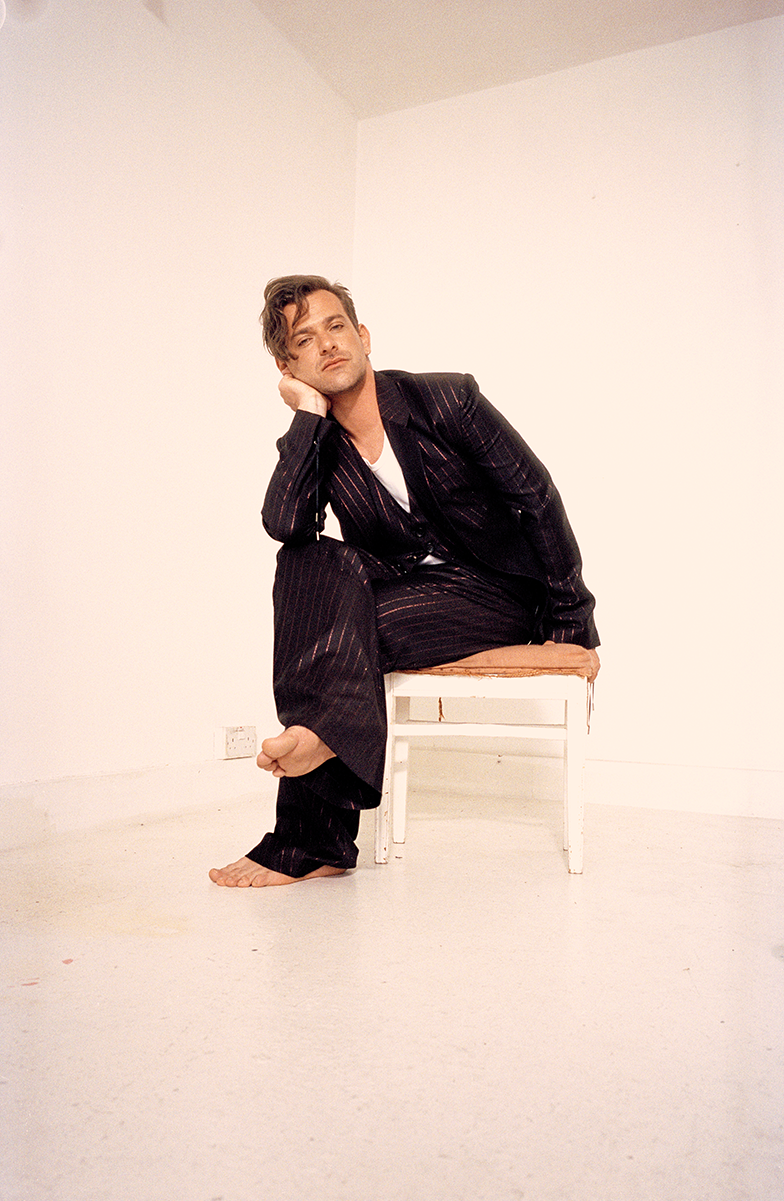
The video for Modern Anxiety is extraordinary. I feel like we’re in an age now where people are just pumping out music videos, or not even releasing music videos. It feels like nothing is new or original. So when I saw this, I was like ‘Oh okay, fucking hell.’ Where did this concept stem from?
I agree, there’s so many music videos, a proliferation of them, I find them fucking boring most of the time. And I was going through music video ideas for this, and I was like, ‘Oh my god, that’s boring, I’m bored.’ And one of my best, oldest friends that I went to university with, she’s a producer now in Australia, she came to stay with me as she’s doing this mentorship programme over here with a TV company. She stayed with me for six weeks, and she was finishing off the edits of a short film she’d done in Australia called Content. And I saw it, first on the computer, and I thought ‘This is really cool, this is really compelling.’ It’s an idea I’d be thinking about for a while, like, ‘How do you get into someone’s mind? How can you actually show that experience of being on the phone?’ Movies always fuck it up, because they can’t use the actual interface, they have to create analogues for FaceTime. So you have to suspend your disbelief, you can’t really be drawn in. But for Content, what they’ve done, it’s a small team and they had done it so brilliantly, it was so faithful to what a phone looks like. I was like ‘Holy shit.’ I watched it, then a few weeks later, we were off our fucking rockers at 4am in the morning. I made a friend watch the first episode of Content and my friend watched it on the phone, and I was watching the friend watch Content. She was having visceral physical reactions, and I was like, ‘This is Modern Anxiety, this is exactly what the song is. Her reaction right now, what I’m seeing right now, this what I’m trying to talk about, we have to make this the video clip.’I turned to Meg and she was like, ‘Fucking great idea, fuck yes, fuck yes.’ Bear in mind we were off our tits. And everyone was so excited, but then it was how do we do this? With a narrative, you have 15 minutes to tell a story, 15 minutes to introduce people to the main functions. You could move through it slower than you could with the music video format, and then you have to edit it to the music. It’s such a different thing. With Modern Anxiety you have three minutes and ten seconds, and that’s the first time people are going to be introduced to that as a format. It raises its own challenges. And so we had to convince the rest of my team that it was a great idea, and some people were 100% behind it, others needed more convincing. That took a couple of weeks, then we went into a couple of weeks of development. And we had so many ideas of how we’d tell the story, or how we would frame it. And we came up with the final treatment at four or five in the morning after we’d been working for 12 or 13 hours solid. And again we were off our tits, but it was brilliant. It took four days to shoot, and then it took another two or three weeks to edit because it’s all animated, that’s one thing that people don’t realise as it looks like a screen-capture, but everything is animated. And it’s not a linear narrative, you’ve got the basic narrative, well I’m not going to go into what the narrative is, but there’s three or four different plot lines happening in it, and hopefully people will look for them. But all the comments that are written, we had to do all of that. A lot of them are pulled from real life. Everyone who’s in the video, are my actual friends, and it’s actual friends’ Instagram stories that we put in the video. All the names, and all the messages are all friends. It’s a very personal project.
What kind of effect do you hope the song and the video will have on audiences?
I don’t want people to be bored watching the music video, that was my main thing, I don’t want people to be bored watching another music video. I want to entertain people. The first time I watched Content, and the first time I watched Modern Anxiety, it was very satisfying watching the video when we did our final edit, because I didn’t feel anxious, but I felt nervous because when I see other people watching it, it translates into a sort of anxiety for them because I can’t control the movement. I would love for people to feel anxious, but in the way you feel anxious when you’re on a rollercoaster. To get some sort of visceral, physical experience when you’re watching a music video, or something on the screen, which is such a passive form of getting stuff. If I can achieve that, then that’s amazing, like I’ve overridden the system. But really, I just want people to be entertained and engaged and think about what it is.
I was very entertained. I didn’t want to admit it, as I didn’t know if it would offend you, but I was slightly anxious watching it.
What it says on the tin! It’s called Modern Anxiety, so it’s amazing that when you watched that video you felt the, ‘Eugh, I don’t know what’s going on!’
You also released Alone, which sonically feels completely different to Modern Anxiety. Both of them have themes of anxiety and loneliness, but sonically this one is quite different. Can you tell me the story behind this one?
This song is more of like a patchwork across years, like different postcards. This is more about my relationship with other people, as opposed to my relationship with myself and my environment, which is Modern Anxiety. Alone is really about needing people. I don’t know if you’ve ever had this, but when you’re craving company, not because you need it, not because there’s any specific purpose, or you want to see a friend, you just want to be around people. And your need to keep that going, is actually quite unattractive to those around you. It’s like the end of the party, when you can’t afford to have the party stop. It’s that sort of loneliness. It’s also the waking up the next day in your bed alone after you’ve been at the party, and you’re like, ‘Oh my god, my head. It’s a prison, and it’s going too quickly.’ It’s more psychodrama, these two songs are both like psychobabble. But one’s more about my relationship with other people, concerns of letting people down, failing their perceptions of me, being too intense, not being intense enough. Rather than just settling into yourself and taking your space. It was just a time in my life when I wasn’t doing that, but now I do.
You once said you didn’t want your music to be known as gay music – can you expand on that for me?
I find it reductive. I also think the gay experience is even more reductive. There is the queer experience, which is a far more inclusive experience and far broader experience. And I think there’s maybe alienation and marginalisation at times in your life, that other people didn’t experience, like a sense of otherness. There’s also a sense of total freedom and inclusiveness and a much deeper sense of community that exists in society today. I’m okay with my music being known as queer music, or music talking about the queer experience. But I did have an issue, as I grew up in the 90s and the early 00s, and I saw a lot of my most-loved artists’ careers just disappear because they were labelled as a gay artist or a lesbian artist, or lesbian music or gay music. And I wasn’t listening to their music in that way until I read that. I was listening to their music as a celebration of the human experience, or the discussion of a type of love. And the moment you hear that, it’s very fucking reductive. You don’t call Madonna’s music ‘white woman music from America’ or Britney Spears’s earliest years ‘virginal privileged American teenaged girl music.’ It’s music for everyone. I guess you do in cancel culture, like MJ’s [Michael Jackson] music has now become to me something else. I find it reductive, I find there’s a more sophisticated way to saying it. I think when I said that, I don’t think that the culture that exists now existed then. And I would still stand by that statement when I said that, which I think was several years now. But I think we have a much more nuanced and sophisticated understanding of an individual’s experience. Because that’s all it is, I’m singing about my experience and hoping that resonates with other people, and in that way I can find other people. It’s just reductive and alienating?
I’ve spoken to quite a few rising queer singer-songwriters over the past year and they said they’re often put onto LGBT playlists, but not others. They don’t make it onto other playlists. Is that something you’ve experienced?
No, I haven’t experienced it because I’ve not ever been willing to properly accept that mantle for that reason, I didn’t want to be pigeonholed. And I didn’t want to be lifted because of that either, because it can work both ways. It can be a blessing as well as a curse. I just wanted my music to speak for itself. But I think once upon a time that might’ve happened. There have been a load of trailblazers in the last five years, you’ve had Sam Smith, in terms of their mainstream success. We’ve always had amazing LGBT artists, but the people who put these playlists together are like, ‘Oh they’re an LGBT artist.’ Even though it’s a massive hit, they’ll only put it on that playlist. I think that everyone has had a big collective rewiring in the last five years and been like, ‘Oh, this LGBT artist has a massive hit, but it could be a massive hit everywhere.’ So people are more willing to branch out, I think it’s really great time for LGBT queer artists at the moment. And I think a lot of work has been done to get us here.
Finally, what can you tell me about your second studio album?
It’s coming next year, I’m just doing final touches on that. And sonically it is a mixed bag, as was my first one, I think. And I think that’s what I’m interested in. Thematically it deals with a lot of issues that I found really funny, and I tried to do it in a light way, because that was the only way I could do it. If I was too happy about all of it, not even when writing, but when I was thinking about it, I’d get stuck in this maze. But by trying to be light, and graceful in the way I dealt with stuff, and with compassion for myself and for other people which I’ve lacked in the past, but I feel like I have a lot more of that now. That’s kind of what’s gone into the writing process. And sonically I’ve been restrained. This whole album is open. I felt like I lived in a prison of my own making for eight years. I feel with the first album, I was so proud of that, but I feel this whole album is about connecting with people.
Modern Anxiety and Alone are available to stream now.

